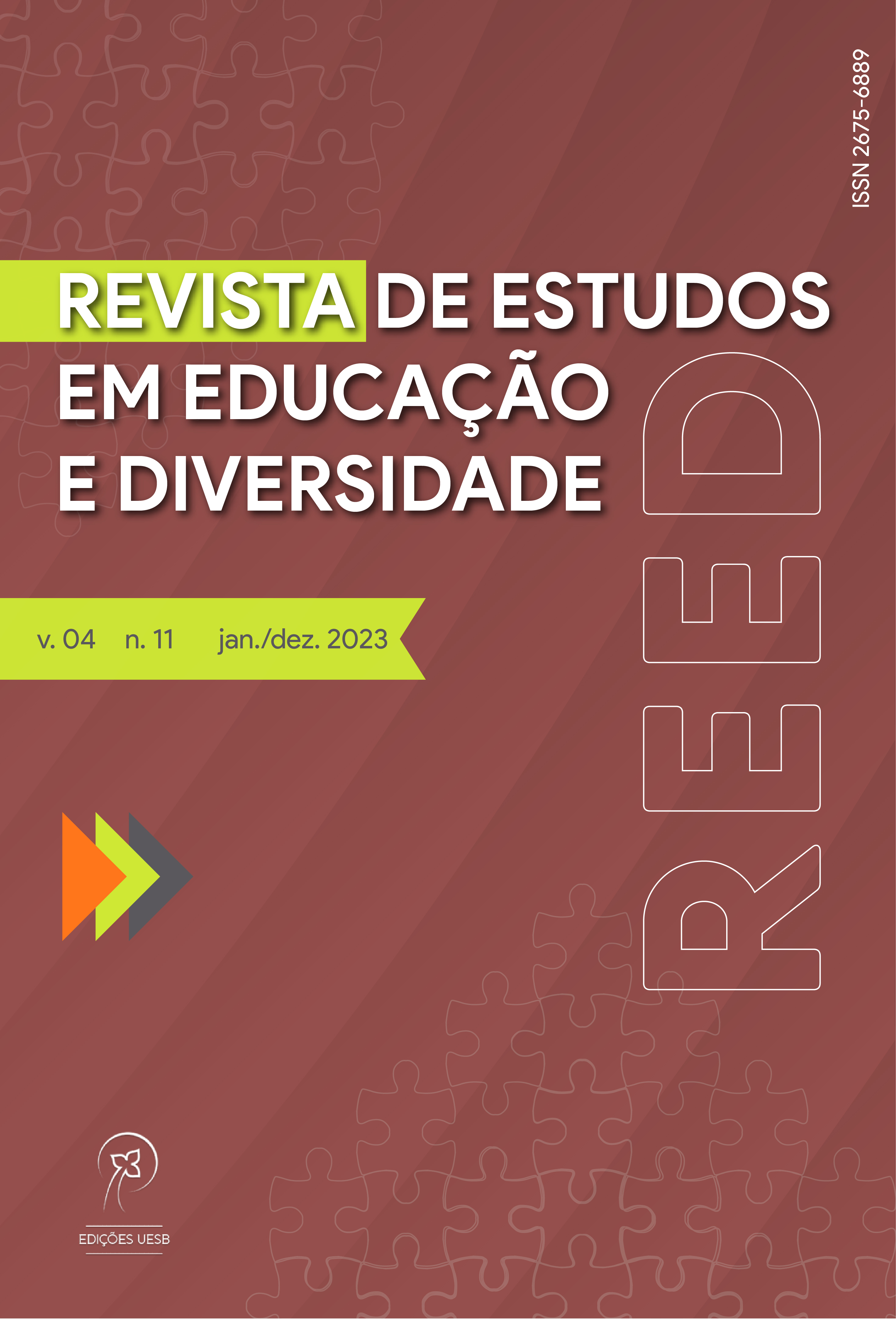The paths from Arandu to Kimistari: ethnic-racial relations in chemistry education
DOI:
https://doi.org/10.22481/reed.v4i11.14041Keywords:
ethnic-racial relations, thematic workshops, indigenousAbstract
This work was developed within the scope of the Chemistry subproject of the Institutional Program for Teaching Initiation Scholarships (PIBID) with the aim of assisting basic education students in understanding science through a historical-cultural perspective, highlighting the individuality of diverse peoples in the production of methods and products involving chemistry. The justification for the interest in the theme lies in the multicultural diversity of our country; thus, it is necessary for this diversity to be addressed in the school environment, also presenting that the knowledge constructed in Sciences and Technologies is not solely constituted by European cultures. In the activities, we sought to explore aspects of indigenous and Egyptian cultures and the history of black individuals in science. The didactic strategy used in the project's intervention was thematic workshops, considering that they present themselves as a dynamic teaching approach capable of promoting discussions about the history of chemistry and addressing chemical content using both theory and practice. Three workshops were held, titled respectively: “Who produces science?”, “What’s up, beauty?” and “Arrow in chemistry!”, which disagreed about the diversity that exists in Brazil and how this diversity is related to chemistry. The project was implemented at the State College Governor Luís Viana Filho in Feira de Santana - Bahia, in different high school classes. The experience at the school with Thematic Workshops provided several benefits to all involved in the project, students, supervision, coordination, and those beginning in teaching. Thus, validating the work developed through PIBID, which brought development to society and the academic community.
Downloads
References
ALVINO, Antonio Cesar Batista; MOREIRA, Marilene Barcelos; LIMA, Geisa Louise Mariz; SILVA; Aliny Gomes; MOURA, Arcanjo Rodrigues de.; BENITE, Anna Maria Canavarro. Química Experimental e a Lei 10.639/2003: a inserção da história e cultura africana e afro-brasileira no ensino de Química. Química Nova na Escola, São Paulo, v. 42, n. 2, p. 136-146, 2020.
BRASIL. Lei nº 11.645, de 10 de março de 2008. Altera a Lei nº 9.394, de 20 de dezembro de 1996, modificada pela Lei nº 10.639, de 9 de janeiro de 2003, que estabelece as diretrizes e bases da educação nacional, para incluir no currículo oficial da rede de ensino a obrigatoriedade da temática "História e Cultura Afro-Brasileira e Indígena”. Diário Oficial da União, Seção 1, p.1, 2008.
CEBULSKI, Elisabete Soares; MATSUMOTO, Flávio Massao. A história da química como facilitadora da aprendizagem do ensino de Química. Departamento de Química da UFPR, 23 de junho de 2010. Disponível em: http://www.diaadiaeducacao.pr.gov.br/portals/pde/arquivos/2035-8.pdf . Acesso em: 09/01/2023.
DELIZOICOV, Demétrio; ANGOTTI, Jose André. Metodologia do ensino de ciências. São Paulo: Cortez, 1990.
FREIRE, Paulo. Pedagogia do Oprimido. Rio de Janeiro: Paz e Terra, 1970.
GONÇALVES, Petronilha Beatriz; SILVÉRIO, Valter Roberto (Org.). Educação e ações afirmativas: entre a injustiça simbólica e a injustiça econômica. Brasília: Instituto Nacional de Estudos e Pesquisas Educacionais Anísio Teixeira, 2003.
GONZAGA, Kézia Ribeiro; BENITE, Cláudio Roberto Machado. A experimentação no ensino de química e os saberes indígenas. Dissertação (Mestrado em Ensino de Ciências) - Programa de Pós-Graduação em Ensino de Ciências, Universidade Estadual de Goiás, Anápolis, GO, 2020.
LEAL, Geovane de Melo.; MOURA, Antônia Maria Alves de Moura.; SILVA, Davi da. Estudo sobre educação das relações étnico-raciais no ensino de química: um panorama dos trabalhos publicados no ENEQ. Revista Cocar, v. 16, n. 34, p. 1-17, 2022.
MARCONDES, Maria Eunice Ribeiro. Proposições metodológicas para o ensino de Química: oficinas temáticas para a aprendizagem da ciência e o desenvolvimento da cidadania. Revista em extensão, v. 7, n. 1, p. 1-11, 2008.
PINHEIRO, Bárbara Carine Soares; ROSA, Katemari (Org.). Descolonizando Saberes: a Lei 10639/2003 no ensino de ciências. São Paulo: Livraria da Física, 2018.
PINHEIRO, Bárbara Carine Soares. Descolonizando Saberes: Mulheres Negras na Ciência. São Paulo: Livraria da Física, 2020.
PINHEIRO, Bárbara Carine Soares. História Preta das Coisas: 50 invenções científico-tecnológicas de pessoas negras. São Paulo: Livraria da Física, 2021.
SIMPLÍCIO, Laís Garcia. Contribuições dos povos africanos e da diáspora na produção do conhecimento científico: uma abordagem para o ensino de química. Trabalho de Conclusão de Curso (Curso de Licenciatura em Química), Universidade Federal Fluminense, 2019.
SOARES, Odair Nunes. Possibilidades emergentes de uma prática pedagógica interdisciplinar e contextualizada com estudantes do ensino médio. Dissertação (Mestrado em Educação em Ciências) - Programa de Pós-Graduação em Educação em Ciências: Química da Vida e da Saúde, Universidade Federal do Rio Grande-FURG, 2019.
TORRALBO, Daniele; Silva, Dayse; Silva, Erivanildo; Souza, Fábio; Akahoshi, Luciane; Marcondes, Maria Eunice; Carmo, Miriam; Suart, Rita de Cássia; Martorano, Simone. Oficinas temáticas no ensino público: formação continuada de professores. São Paulo: FDE., 2007.
Downloads
Published
How to Cite
Issue
Section
License
Copyright (c) 2023 Revista de Estudos em Educação e Diversidade - REED

This work is licensed under a Creative Commons Attribution 4.0 International License.
You are free to:
Share - copy and redistribute the material in any medium or format; Adapt - remix, transform, and build from the material for any purpose, even commercially. This license is acceptable for Free Cultural Works. The licensor cannot revoke these freedoms as long as you follow the terms of the license.
Under the following terms:
Attribution - You must appropriately give credit, provide a link to the license, and indicate if any changes have been made. You may do so in any reasonable way, but not in a way that suggests that you or your use is endorsed by the licensor.
There are no additional restrictions - You cannot apply legal terms or technological measures that legally restrict others to make any use permitted by the license.






